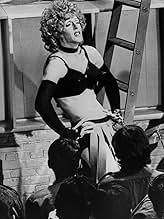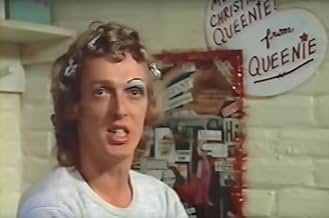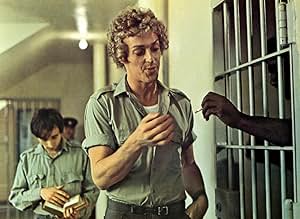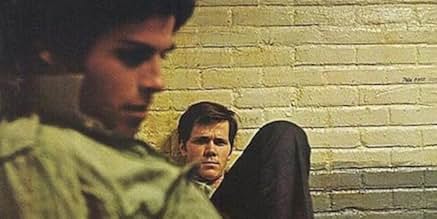Young, naive Smitty is sent to prison for six months and bunks with other convicts, specifically quiet cocky bully Rocky. Eventually Rocky offers protection to Smitty for a price and Smitty ... Read allYoung, naive Smitty is sent to prison for six months and bunks with other convicts, specifically quiet cocky bully Rocky. Eventually Rocky offers protection to Smitty for a price and Smitty becomes a most reluctant sexual slave.Young, naive Smitty is sent to prison for six months and bunks with other convicts, specifically quiet cocky bully Rocky. Eventually Rocky offers protection to Smitty for a price and Smitty becomes a most reluctant sexual slave.
Lee Broker
- Screwdriver
- (as Larry Perkins)
Featured reviews
Theme of homosexuality and rape in prison was very daring for its time (1971). You could feel the pain of the lead character as he succumbs to the brutal advances of his cellmate, while longing for his girlfriend.
I saw the movie when it first came out, and I still remember the line uttered by a prisoner as he observes a gang rape- "Nobody's going to stop a man from getting his oats." It's one of my all-time favorite quotes from films.
I saw the movie when it first came out, and I still remember the line uttered by a prisoner as he observes a gang rape- "Nobody's going to stop a man from getting his oats." It's one of my all-time favorite quotes from films.
I saw some friends talking about this film on the internet, and decided to see if I could find it anywhere. It's not available at all on DVD, but my state library system does have it on VHS tape. I have no VHS tape player, as I got rid of it years ago. BUT, someone mentioned that it's available online. free.. The resolution isn't very good, but it's watchable!
'Fortune and Men's Eyes' is a film which I recommend as interesting viewing for anyone who wishes to watch an early story of important gay cinema.
It's author, the late playwright Jonhn Herbert, is an icon of gay writing.
This is a story based on John Herbert's own unfortunate true experience as an inmate as a teenager in a penal institution in Canada, wrongly imprisoned after being the victim of gay bashing. It is a play that later became a film.
I recommend that you watch this film despite the fact that it is old, to say the least.
It's author, the late playwright Jonhn Herbert, is an icon of gay writing.
This is a story based on John Herbert's own unfortunate true experience as an inmate as a teenager in a penal institution in Canada, wrongly imprisoned after being the victim of gay bashing. It is a play that later became a film.
I recommend that you watch this film despite the fact that it is old, to say the least.
It was a good thing they had a cast-audience group discussion following off-Broadway weekend performances of "Fortune and Men's Eyes."
That way whatever questions may have been on attendees' minds could be fielded directly to cast members and director, which were seated across the proscenium.
After the performance I had the pleasure of attending, I was struck by the candor of that production's "working family." Somehow, the intimate nature of the play appeared to make for great cast cohesiveness, and the discussion was lively and informative. It also provided greater clarity as to what both Playwright John Herbert had in mind and what the director was trying to express.
Unfortunately, in the film version (scripted by the playwright) there was something missing. Despite a fine cast delivering thoroughly thoughtful performances, an unrelenting downbeat pall seems to hover over everything.
It's been reported that the film's producers wanted the sensational qualities emphasized; they got their wish--probably at the expense of a broader, more poetic and philosophical statement of the human condition.
Michael Greer offered an outstanding Queenie, a character that is quite convincing. However, it's a bitter, sardonic soul whose surface sense of humor's only a cover for a wounded interior.
Zooey Hall's Rocky is likewise expertly rendered and completely believable--yet a crafty and cold individual with few redeeming qualities.
Wendell Burton's Smitty is the most empathetic character, yet a "pothead" and "looser"--not at all the "innocent" he purports to be.
Harvey Hart's & Jules Schwerin's codirection is adequate, given their parameters. Yet the entire production fails to rise much above the norm, despite many powerful and effective expose scenes.
It's interesting to note the careers of the above three lead actors: Burton had the most work, yet roles were few and far between, and he retired from acting at the early age of 40. Hall, despite his good looks and fine talent, only did three more films after this. Greer likewise had a very limited film career (his Queenie role perhaps seriously type casting him).
Though I never saw Sal Mineo's stage production, I heard that it was even more controversial and sensational than either of the above two versions.
And that's going some.
That way whatever questions may have been on attendees' minds could be fielded directly to cast members and director, which were seated across the proscenium.
After the performance I had the pleasure of attending, I was struck by the candor of that production's "working family." Somehow, the intimate nature of the play appeared to make for great cast cohesiveness, and the discussion was lively and informative. It also provided greater clarity as to what both Playwright John Herbert had in mind and what the director was trying to express.
Unfortunately, in the film version (scripted by the playwright) there was something missing. Despite a fine cast delivering thoroughly thoughtful performances, an unrelenting downbeat pall seems to hover over everything.
It's been reported that the film's producers wanted the sensational qualities emphasized; they got their wish--probably at the expense of a broader, more poetic and philosophical statement of the human condition.
Michael Greer offered an outstanding Queenie, a character that is quite convincing. However, it's a bitter, sardonic soul whose surface sense of humor's only a cover for a wounded interior.
Zooey Hall's Rocky is likewise expertly rendered and completely believable--yet a crafty and cold individual with few redeeming qualities.
Wendell Burton's Smitty is the most empathetic character, yet a "pothead" and "looser"--not at all the "innocent" he purports to be.
Harvey Hart's & Jules Schwerin's codirection is adequate, given their parameters. Yet the entire production fails to rise much above the norm, despite many powerful and effective expose scenes.
It's interesting to note the careers of the above three lead actors: Burton had the most work, yet roles were few and far between, and he retired from acting at the early age of 40. Hall, despite his good looks and fine talent, only did three more films after this. Greer likewise had a very limited film career (his Queenie role perhaps seriously type casting him).
Though I never saw Sal Mineo's stage production, I heard that it was even more controversial and sensational than either of the above two versions.
And that's going some.
I saw this in the Cosmo (pre GFT) in Glasgow one afternoon. The original and still the best movie on prison sex. Kept me to the straight and narrow! Powerful, unpleasant, occasionally verging on crudeness. Definitely best viewed after some libation. Not a date movie. Recommended - once.
Did you know
- TriviaSal Mineo directed the 1969 Los Angeles production "Fortune and Men's Eyes and played the role of Rocky, a prison bully, who rapes a naive young prisoner, Smitty (played by Don Johnson in the L.A. production). Mineo's staging emphasized violence and sexuality. He added a scene to the play, staging Rocky's rape of Smitty in the prison shower, an event that had been kept off stage in earlier productions. The Los Angeles production, which was eventually moved to New York (without Mineo as an actor) featured full frontal nudity. Mineo also directed a subsequent San Francisco production. Although playwright John Herbert did not initially object to Mineo's alterations, he vociferously criticized Mineo's Los Angeles and New York stagings. (Being a convicted felon, the Canadian Herbert was unable to enter the U.S. to actually see the productions.) Herbert refused to sell him the film rights to his play, and the estrangement obviated any chance of Mineo being involved in the 1971 movie version of the play.
- ConnectionsReferenced in Come of Age (1971)
- How long is Fortune and Men's Eyes?Powered by Alexa
Details
- Release date
- Country of origin
- Language
- Also known as
- Sreća i ljudske oči
- Filming locations
- Québec, Canada(prison)
- Production companies
- See more company credits at IMDbPro
Box office
- Budget
- CA$1,109,000 (estimated)
- Runtime
- 1h 42m(102 min)
- Sound mix
Contribute to this page
Suggest an edit or add missing content


























